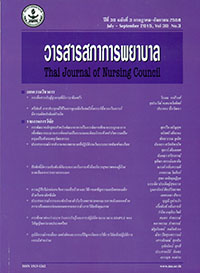อุบัติการณ์การเลื่อน-งดผ่าตัดและการแก้ปัญหาโดยการใช้ การวิจัยเชิงปฎิบัติการแบบมีส่วนร่วม
Keywords:
อัตราการเลื่อน-งดผ่าตัด, ใบคำสั่งแพทย์เตรียมผ่าตัด, postponements and cancellations of operations, Pre-Operative Physician Order Sheet, solutionAbstract
บทคัดย่อ: วัตถุประสงค์การวิจัย: เพื่อกำหนดแนวทางปฏิบัติในการลดอัตราการเลื่อน- งดผ่าตัด และเพื่อลดค่าเจาะเลือดที่ไม่จำเป็นให้ผู้ป่วย
การออกแบบวิจัย: วิจัยเชิงปฏิบัติการแบบมีส่วนร่วม
การดำเนินการวิจัย: กลุ่มประชากรคือผู้ป่วยในแผนกศัลยศาสตร์ที่มีคำสั่งแพทย์เตรียม ผ่าตัดตั้งแต่ปี พ.ศ. 2547-2556 เก็บข้อมูลจากบันทึกผู้ป่วยในและตารางผ่าตัดของภาค วิชาศัลยศาสตร์ หาสาเหตุของการเลื่อน-งดผ่าตัดแบบไม่ฉุกเฉิน ทั้งสาเหตุที่ควบคุมได้และ สาเหตุที่ไม่สามารถควบคุมได้ ส่งผลกระทบต่อผู้ป่วยและญาติ ผู้ป่วยและญาติไม่พึงพอใจ ผู้ป่วยอยู่โรงพยาบาลนานขึ้น เสียค่าใช้จ่ายเพิ่ม เสี่ยงต่อการติดเชื้อเพิ่มขึ้น ทีมนำทางคลินิก ศัลยศาสตร์ จึงแก้ไขสาเหตุที่ควบคุมได้ก่อน เริ่มจากการพัฒนาบริการผู้ป่วยที่รับเป็นผู้ป่วย ในอย่างเป็นระบบโดยผ่านทางการใช้ใบ pre-operative physician order sheet เปรียบเทียบ ก่อนและหลังใช้ โดย ที่ศัลยแพทย์ใช้ใบนี้ในการรับผู้ป่วยในที่หน่วยตรวจผู้ป่วยนอก นำข้อมูล ที่ได้มาเปรียบเทียบวิเคราะห์โดยใช้สถิติเชิงพรรณนาและ one-sample t-test แสดงผล เป็นค่าเฉลี่ยและร้อยละ
ผลการวิจัย: พบว่าอัตราการเลื่อน-งดผ่าตัดทุกสาเหตุลดลงเฉลี่ยร้อยละ 2.24 ต่อปี เป็นสาเหตุที่ควบคุมได้ลดลงร้อยละ 0.34 (p<0.03) สาเหตุควบคุมไม่ได้ลดลงร้อยละ 1.90 อีกทั้งประหยัดค่าใช้จ่ายในการเจาะเลือดผู้ป่วยเฉลี่ย 3.54 ล้านบาทต่อปี
ข้อเสนอแนะ: จากการศึกษานี้เสนอว่าควรส่งเสริมให้มีการใช้ใบ pre-operative physician order sheet ต่อไป และให้มีการทบทวนข้อมูลให้ทันสมัยเสมอ.
Abstract: Objective: To determine a course of action to reduce postponements and cancellations of operations, and to reduce unnecessary blood-sampling fees in some patients.
Design: Participatory action research.
Implementation: The subjects were surgery ward patients who were ordered by their physicians to have operations between 2004 and 2013. Date were collected from the in-patient department’s records and the surgery department’s operation schedule. The purpose of this study was to identify both controllable and uncontrollable causes of non-emergency postponements and cancellations of operations, and the effects of such postponements and cancellations on the patients and their relatives, namely, their dissatisfaction with prolonged hospitalisation, increased expenses, and increased infection risk. The surgery clinic team, therefore, addressed the controllable causes first, starting by developing a system of admitting in-patients based on the ‘Pre-Operative Physician Order Sheet’. Then a comparison between the admittance process before and after the use of the order sheet was made by the surgeons who administered this form as part of out-patient admittance. The data were analysed using descriptive statistics and one-sample t-test in terms of means and percentage.
Results: The study showed an annual average 2.24% decrease in operation postponements and cancellations due to every cause. Controllable causes were decreased by 0.34% (p < 0.03) and uncontrollable causes by 1.90%. Such decrease led to an annual saving of up to 3.54 million Baht on blood-sampling expenses.
Recommendations: Based on this study, it is suggested that the use of the ‘Pre-Operative Physician Order Sheet’ be promoted, reviewed, and updated.







